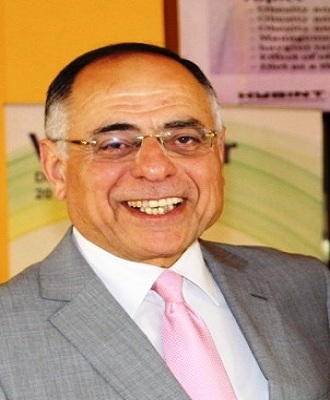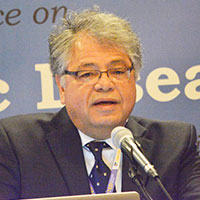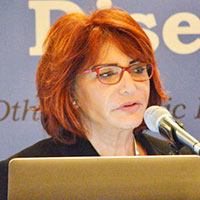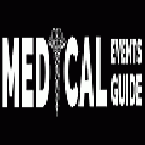Session/Tracks
Tracks 1. Nanomedicine
Nanomedicine harnesses nanoscale science and engineering to revolutionize diagnosis, treatment, and prevention of diseases. This session explores how nanomaterials—such as nanoparticles, quantum dots, and nanoemulsions—interact with biological systems to achieve targeted therapeutic effects. Focus areas include nano-enabled imaging, molecular diagnostics, personalized therapies, and multifunctional drug carriers. Cutting-edge topics such as nanomedicine’s role in regenerative medicine, tissue engineering, and point-of-care diagnostics will also be addressed. This track is ideal for researchers, clinicians, and industrial partners involved in the design and application of nanoscale medical technologies.
Tracks 2. Therapeutics
This track delves into the evolving landscape of therapeutics powered by advances in nanotechnology. Sessions focus on novel treatment modalities that go beyond conventional pharmaceutical approaches, emphasizing targeted therapy, controlled release systems, and improved bioavailability. Innovations in biologics, small molecule delivery, peptide-based treatments, and monoclonal antibodies will be discussed alongside case studies on chronic diseases, cancer, and genetic disorders. Emphasis will be placed on translational research, clinical development, and therapeutic efficacy driven by precision delivery systems.
Tracks 3. Smart Drug Delivery
Smart drug delivery systems represent a breakthrough in precision medicine. This session covers nanoscale platforms engineered to deliver therapeutic agents in response to specific biological stimuli—such as pH, temperature, enzymes, or magnetic fields. Presentations will explore advancements in stimuli-responsive nanocarriers, self-regulating drug systems, and real-time controlled release mechanisms. Topics include drug targeting in tumors, inflammation sites, and infected tissues. Researchers, pharmaceutical developers, and clinicians will find value in the intersection of material science, biotechnology, and patient-centered therapeutics.
Tracks 4. Nanotechnology
This foundational track provides a broad overview of nanotechnology’s role in healthcare and drug development. It will explore nanofabrication techniques, surface modifications, and the synthesis of nanostructured materials for biomedical use. The session highlights how nanoscience has transformed medicine—from diagnosis to therapy—enabling new paradigms in personalized healthcare. Attendees will gain insights into future nanotechnologies, nano-biosensors, nanoelectronics, and integrated nano-devices. It also offers discussions on ethical, regulatory, and environmental concerns surrounding the use of nanotechnologies.
Tracks 5. Nanoformulations
Nanoformulations are revolutionizing how drugs are delivered, absorbed, and metabolized. This session covers the design and development of nano-based drug formulations such as nanosuspensions, solid lipid nanoparticles, nanocrystals, and nanoemulsions. Key topics include improving solubility, targeting mechanisms, pharmacokinetics, and overcoming biological barriers. Presenters will share case studies and clinical advancements in nanoformulation strategies applied to antibiotics, anticancer drugs, CNS drugs, and biologics. This track is especially relevant for formulation scientists, pharmacists, and regulatory professionals.
Tracks 6. Pharmaceutical Nanotechnology
Focusing on the industrial and pharmaceutical implications of nanotechnology, this track discusses how nano-based strategies are integrated into the drug development pipeline. Topics include nanoencapsulation, scale-up manufacturing, nanotoxicity evaluation, and compliance with GMP and FDA regulations. Presenters will discuss how pharmaceutical nanotechnology accelerates new drug approvals, extends patent life, and offers solutions to drug resistance. The track also covers cosmeceuticals, nano-pharmacovigilance, and applications in personalized medicine.
Tracks 7. Cancer
This track focuses on the role of nanotechnology in the detection, diagnosis, and treatment of cancer. Explore nanocarriers for chemotherapy, RNA/DNA-based therapies, immuno-oncology, and radiotherapy enhancement. The session includes updates on clinical trials involving nanomedicine in oncology, tumor-targeted nanoparticles, and nano-imaging for early detection. Cutting-edge research on nano-enabled photothermal and photodynamic therapy will also be presented. Oncologists, researchers, and bioengineers will benefit from in-depth discussions on overcoming multidrug resistance and enhancing tumor penetration.
Tracks 8. Nanorobotics
Nanorobotics is poised to transform medicine with microscopic devices capable of performing tasks inside the human body. This session explores the design, fabrication, and real-time control of nanorobots used for precise drug delivery, cancer cell targeting, biosensing, and tissue repair. Key topics include propulsion mechanisms, bio-hybrid systems, AI-guided nanobots, and navigation in complex biological environments. Applications in cardiovascular disease, neurology, and targeted therapy will be discussed, along with ethical and regulatory considerations.
Tracks 9. Bio-Nanomachines
This session focuses on nanoscale machines inspired by biological systems, such as protein motors, DNA origami, and enzyme-based nanodevices. Presentations will highlight how these machines perform specific biomedical tasks like intracellular delivery, drug release, or diagnostics at the molecular level. Innovations in bio-nanomachine design, self-assembly, and actuation mechanisms will be explored. This interdisciplinary track is ideal for molecular biologists, bioengineers, and materials scientists working on the next generation of nanomedical tools.
Tracks 10. Nanovaccines
Nanovaccines utilize nanoscale platforms to enhance immunogenicity, stability, and targeted delivery of antigens. This session covers lipid nanoparticles (LNPs), virus-like particles (VLPs), and polymeric nanoparticles for vaccine development. The success of mRNA-based COVID-19 vaccines has spotlighted this field, and discussions will include applications for infectious diseases, cancer, and autoimmunity. The track will also explore nanoadjuvants, immune modulation, and the scalability of nanovaccine production.
Tracks 11. Theranostics
Theranostics refers to the integration of diagnostic and therapeutic functionalities into a single nanosystem, enabling simultaneous disease detection and treatment. This session explores the design and application of multifunctional nanoparticles for imaging-guided therapy, real-time monitoring, and precision medicine. Topics include contrast agents for MRI, CT, and PET; photothermal/photodynamic agents; and smart systems that respond to specific biomarkers. The session will also cover advancements in cancer theranostics, infectious disease management, and targeted delivery mechanisms for individualized therapy. This track is ideal for researchers developing multifunctional nanoplatforms for personalized healthcare.
Tracks 12. Nanotechnology in Medicine
This track provides a comprehensive view of nanotechnology’s transformative role in healthcare, beyond drug delivery. It explores nanosensors for biosensing, lab-on-a-chip systems, tissue engineering scaffolds, and nanocoated medical implants. Presentations will address current challenges in material biocompatibility, nanosafety, and translational barriers. Topics will also include the convergence of nanotech with digital health, AI, and wearable technologies. Attendees will gain insights into real-world clinical applications, from diagnostics to minimally invasive surgeries.
Tracks 13. Neuroscience and Nanomedicine
This session explores how nanotechnology enhances our understanding and treatment of neurological disorders. Topics include nanoscale tools for imaging the brain, neural interface development, and nanoparticle-based modulation of neural circuits. Researchers will also present nano-enabled drug delivery approaches that cross the blood-brain barrier (BBB) to treat conditions like Alzheimer’s, Parkinson’s, epilepsy, and stroke. Cutting-edge research in neuroimaging, brain-on-chip models, and neuronal regeneration through nanoscaffolds will also be featured.
Tracks 14. Neurotherapeutics and Nanocarriers
Delivering therapeutic agents to the brain remains one of the greatest challenges in medicine. This track focuses on nanoparticle systems designed for neurotherapeutics, including lipid-based carriers, dendrimers, polymeric nanoparticles, and exosome mimetics. Presentations will explore treatment options for neurodegenerative diseases, brain tumors, and psychiatric disorders. Special attention will be given to overcoming the blood-brain barrier, sustained drug release, and minimizing neurotoxicity. The session also addresses preclinical and clinical evaluation of nanoformulations in neurology.
Tracks 15. Nanoparticles in Drug Delivery
Nanoparticles serve as versatile vehicles for precise drug delivery, diagnostics, and imaging. This session highlights various types of nanoparticles—such as gold, silver, silica, polymeric, and magnetic—and their biomedical applications. Discussions will include design optimization, surface functionalization, targeting strategies, pharmacokinetics, and biodegradation. Presenters will showcase novel systems tailored for cancer therapy, infectious disease treatment, inflammation, and genetic disorders. Toxicological profiling and scalability will also be explored, providing a full view from lab to clinic.
Tracks 16. Gene Delivery Technologies
This track focuses on nanocarrier platforms for safe and effective delivery of genetic materials, including DNA, mRNA, siRNA, and CRISPR-Cas systems. Topics include non-viral delivery strategies, lipid nanoparticles (LNPs), polymer complexes, and exosomes. The session will explore nanocarrier design for targeting specific tissues, nuclear localization, and overcoming intracellular barriers. Applications in genetic diseases, cancer immunotherapy, and regenerative medicine will be discussed. The role of nanomedicine in advancing gene editing and personalized gene therapy is central to this track.
Tracks 17. Oncology Therapeutics
This session focuses on the latest nanomedicine-based approaches to cancer treatment. Key themes include tumor microenvironment-responsive nanocarriers, nano-immunotherapies, RNA-based cancer therapies, and combinational treatment modalities. Discussions will highlight preclinical breakthroughs, ongoing clinical trials, and novel targeting strategies for various cancer types. Presenters will address how nanotechnology enhances therapeutic efficacy, reduces toxicity, and improves patient compliance. This track invites oncologists, nanotechnologists, and pharmaceutical scientists working on cutting-edge cancer therapies.
Tracks 18. Nanomedicine in Infectious Diseases
Nanotechnology is revolutionizing the prevention, diagnosis, and treatment of infectious diseases. This session highlights nano-enabled platforms for antimicrobial delivery, viral inactivation, biofilm disruption, and point-of-care diagnostics. Topics include the use of nanomaterials in HIV, tuberculosis, influenza, and emerging viral infections. Presenters will discuss the potential of nanoparticles to overcome drug resistance and enhance immune responses. Attention will be given to global health applications and pandemic preparedness through rapid diagnostic and therapeutic tools.
Tracks 19. Vaccinology and Nanotechnology
This session focuses on the development of next-generation vaccines enhanced by nanotechnology. Nanoparticles serve as carriers, adjuvants, and antigen delivery systems that improve immunogenicity and reduce side effects. Topics include mRNA vaccines, DNA vaccines, peptide-based vaccines, and nanocarriers targeting mucosal immunity. Case studies on COVID-19, HPV, malaria, and cancer vaccines will be presented. Regulatory and scalability challenges, along with immune engineering using nanomaterials, will be key components of this track.

















